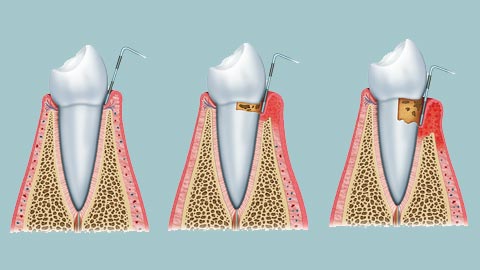
Non-surgical Periodontal Treatment
Periodontal (gum) Health. “Periodontal” means “around the tooth”. Periodontal tissues include the gums and supporting bone that hold teeth firmly in place. Dr. Rodriguez and Team emphasize periodontal health as an important part of your care.
Your gums and jaw bone are vital to your dental health. Consider a foundation for a house, if it is not sturdy and strong, the house collapses, right? Oral health is very similar; without healthy gums and bone, teeth will not survive.
Did You Know?
An estimated 75% of Americans have some form of Periodontal Disease*. Periodontal Disease is a progressive disease that begins when bacteria penetrate and grow beneath the gums. As the disease spreads, gum tissue and eventually bone become infected and are destroyed. If left untreated, periodontal disease can break down enough bone and gum tissue to cause teeth in the affected area to become loose and eventually fall out. Periodontal disease is the most common cause of tooth loss in adults.
(*American Dental Hygienists' Association, 2010)
Common signs of periodontal disease are bleeding and swollen gums, persistent bad breath, and gum recession.
In most cases, periodontal disease does not hurt. At your dental checkup, Dr. Rodriguez and your Dental Hygienist will measure the space between your teeth and gums. Combined with diagnostic dental xrays, this process will help reveal any abnormal “pockets” - an indication of areas of gum disease in need of treatment.
Treatment of Periodontal Disease
If diagnosed early, periodontal disease can often be treated non-surgically in our office. Treatment requires a careful cleaning of the tooth root surfaces to remove plaque and calculus (tartar) from deep periodontal pockets and to smooth the tooth root to remove bacterial toxins. Follow-up maintenance is critical, we recommend that patients see us regularly every 3 months following periodontal therapy, to keep bacteria under control and promote healing.
If you or a loved one is experiencing symptoms of periodontal disease, we urge you to Contact Us for a periodontal health assessment. You will be glad you did!